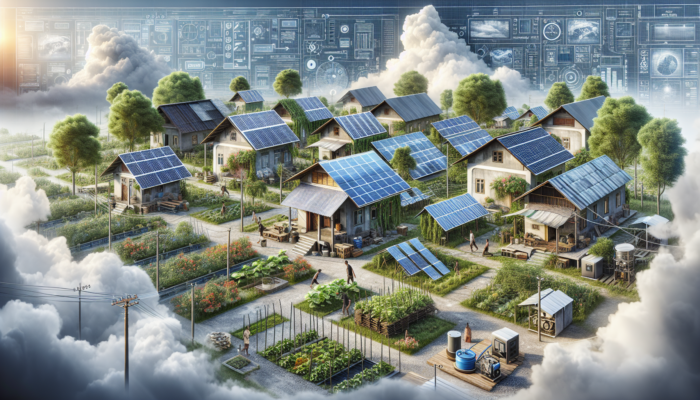Proven Strategies to Effectively Manage a Power Grid Outage
When the lights unexpectedly go out, feelings of panic and confusion can easily set in. However, it is crucial to maintain composure for effectively managing a power grid outage. Whether the blackout is caused by a natural disaster, technical malfunctions, or cyber threats, these disruptions can severely impact daily life. Being adequately prepared and knowing how to respond promptly are essential to ensure your safety and comfort during these trying times. This detailed guide provides vital insights into effectively managing a power grid outage, offering practical strategies, expert tips, and answers to important questions that empower you to navigate these scenarios with assurance and expertise.
Thorough Readiness for Power Outages: Key Steps to Follow

Preparing for a power outage goes far beyond merely formulating a basic plan; it demands a comprehensive strategy that addresses multiple survival elements. Proactive and well-thought-out preparation can significantly mitigate the effects of a power outage, equipping you with essential tools and extensive knowledge to deal with disruptions confidently and smoothly. Take the time to evaluate your needs, collect necessary supplies, and familiarize yourself with the intricacies of your environment, ensuring you’re ready for any unforeseen circumstances that may arise.
Essential Items for Your Emergency Kit: Create the Ultimate Checklist
A fully stocked emergency kit is the foundation of your preparedness efforts. Start by including crucial items such as flashlights, batteries, first aid supplies, and a multi-tool. It's imperative to have a sufficient stock of non-perishable food items and bottled water—aim for at least one gallon per person per day for a minimum of three days. Additionally, think about incorporating a portable phone charger, any vital medications, and hygiene items. In the context of surviving a grid failure, having prompt access to these supplies can be the pivotal difference between chaos and a sense of calm.
Tailor your emergency kit to meet specific personal requirements; for instance, families with young children should make certain to include baby food and other essential items. Regularly inspect and update your kit to ensure that food and medications are within their expiration dates. A meticulously equipped emergency kit not only provides peace of mind but also serves as a vital resource during prolonged outages, enabling you to maintain your health and comfort.
Smart Strategies for Preparing for Future Power Outages
Effective planning is crucial to successfully navigating the unpredictable nature of power grid outages. Begin by evaluating your home’s vulnerabilities—identify which appliances are absolutely essential and consider investing in a generator to provide backup power. Moreover, solar-powered chargers and battery packs can prove to be invaluable tools for keeping smaller devices operational during outages. The primary objective is to ensure you have multiple methods to maintain essential functions in your household.
Establish a clear communication strategy with family and friends. Designate a central meeting point and make sure each person knows how to contact one another during a power outage. Staying informed about your area's infrastructure and potential risks is vital; local news stations and social media channels can offer real-time updates that are essential for surviving a grid failure and making well-informed decisions.
Effective Communication Strategies During Power Outages

Maintaining effective communication during a power grid outage can be both challenging and vital for ensuring safety. Traditional communication systems may falter in the absence of a reliable power supply. To stay informed, consider investing in a battery-operated or hand-cranked radio to receive emergency broadcasts and updates. Ensure that all mobile devices are fully charged, and consider using text messages or social media platforms for communication, especially when cellular networks become congested.
Creating a group chat with family and friends can facilitate keeping everyone updated on any changes. Information is truly your most valuable asset during a power outage—knowing where to find resources, shelter, or assistance can significantly alleviate anxiety and enhance safety for you and your loved ones.
Best Practices for Food and Water Storage During Emergencies
Ensuring food and water security is absolutely essential during a power outage. Stockpile non-perishable items such as canned goods, dried fruits, and nuts. Utilize airtight containers to maintain food freshness and shield it from pests. Implement a rotation system to ensure that older items are consumed first, reducing waste and ensuring you have access to safe food.
Water storage is equally critical. If feasible, consider installing a rainwater harvesting system or invest in a water filtration system to guarantee a clean supply. Familiarizing yourself with household methods to purify water can also be incredibly beneficial. Having access to safe drinking water during a power outage is vital, so adopt best practices for surviving a grid failure by ensuring that you have adequate and easily accessible supplies.
Real-Life Scenarios for Successfully Enduring a Power Outage
Different environments present unique challenges during a power grid failure. Understanding these differences can significantly inform your approach, whether you find yourself in a rural area or a bustling urban center.
Unique Challenges and Solutions for Rural Areas During Power Outages

Living in a rural area often means longer distances to access resources, making preparation particularly crucial. Due to limited infrastructure and resources, residents in these settings may experience extended power outages. Therefore, consider investing in alternative energy sources like solar panels to ensure a reliable backup power supply. These systems can greatly enhance your resilience during a power outage.
Establishing a strong community network can also be invaluable. Working collaboratively with neighbors to share resources, generators, or supplies can enhance preparedness for everyone involved. Additionally, ensuring that your home is equipped for self-sufficiency—such as growing your own food and having reliable water sources—can significantly improve your ability to thrive during a power grid failure.
Strategies for Surviving Power Outages in Urban Settings
In urban environments, the high population density and existing infrastructure can complicate survival efforts during a power outage. Tall buildings may lack adequate emergency lighting and ventilation, making it essential to have a well-thought-out contingency plan in place. While stocking up on essential supplies is crucial, it’s equally important to be aware of local resources—identify nearby emergency shelters and community centers that can provide assistance if needed.
Traffic congestion can quickly escalate into a significant issue during urban outages, making it essential to familiarize yourself with alternative routes and transportation options. Having a bicycle or other means of transportation can prove highly advantageous when surviving a grid failure in a city environment, allowing for greater mobility and access to resources.
Long-Term Strategies for Extended Power Outages: Planning for the Unexpected
Extended power outages can severely disrupt your daily life and necessitate a sustainable plan for living. Focus on achieving energy independence by investing in renewable energy systems such as solar or wind power. These systems can consistently provide energy, thereby reducing your dependence on the grid and enhancing your resilience during prolonged outages.
Creating a community support network can further strengthen your survival strategy. To promote resilience, organize training sessions focused on food preservation, gardening, and essential survival skills. The more knowledge and capabilities you and your community possess, the better equipped you will be to handle extended power outages.
Immediate Actions to Take During Short-Term Outages: Ensuring Safety and Comfort
When faced with a short-term power outage, immediate actions can significantly help maintain comfort and safety. First, turn off and unplug appliances to prevent damage when power is restored. Use candles and flashlights for illumination, but exercise extreme caution to avoid fire hazards associated with open flames.
Check your emergency kit to confirm that you have everything necessary for comfort and safety. Remaining calm and assessing the situation will empower you to make informed decisions. Engaging in enjoyable activities, such as reading or playing board games, can help keep morale high, particularly for children. Remember, surviving a grid failure is not only about practical preparations, but also about maintaining a positive mindset throughout the ordeal.
Expert Recommendations on Strategies for Enduring a Power Outage
To fully comprehend the broader context of power outages, it is essential to understand current industry trends and technological advancements.
The Role of Renewable Energy in Enhancing Power Grid Stability
Renewable energy sources such as solar, wind, and hydroelectric power play a crucial role in enhancing grid stability. By diversifying energy sources, we can reduce our reliance on traditional power grids, making them more resilient against outages. For individuals, investing in renewable energy systems can ensure a reliable power supply during disruptions, thus improving your chances of surviving a grid failure successfully.
Incorporating energy storage solutions, such as batteries, enables households to store excess energy generated during peak production periods. This stored energy can then be utilized during outages, empowering homeowners with greater self-sufficiency.
The Evolution of Smart Grids: Shaping the Future of Power Distribution
Smart grids represent a revolutionary approach to energy distribution, employing advanced technologies to enhance efficiency and reliability. They facilitate real-time monitoring and management of energy consumption, which can alleviate the adverse effects of outages.
By utilizing smart appliances that communicate with the grid, households can optimize their energy usage, thereby reducing strain during peak demand periods. As smart grid technology continues to develop, it offers promising solutions for surviving a grid failure in the future, ensuring you have the resources to adapt to changing conditions.
The Impact of Government Policies on Power Grid Reliability
Government policies are pivotal in shaping the reliability of power grids. Investments in infrastructure, regulations that encourage the adoption of renewable energy, and incentives for energy efficiency are all foundational elements of a resilient power system.
Advocating for strong policies prioritizing grid resilience can significantly boost community preparedness. Engaging with local representatives and participating in public discussions can drive positive change, fostering a safer environment for all.
Technological Innovations to Strengthen Grid Resilience
Technological advancements are continually transforming the landscape of grid reliability. Innovations such as microgrids provide localized energy solutions, enabling communities to operate independently during outages. These systems can be powered by renewable sources, significantly enhancing resilience.
Monitoring technologies that predict and detect outages can also improve response times and reduce the duration of power interruptions. By staying informed about these advancements, individuals can better prepare for surviving a grid failure effectively.
Addressing Common Questions About Surviving a Power Outage
As concerns regarding power outages increase, so do the inquiries surrounding their impact and our level of preparedness.
How Can You Keep Medical Equipment Running During Outages?
Ensuring a backup power source is absolutely essential for individuals reliant on medical equipment. Consider investing in a generator or an uninterruptible power supply (UPS) to maintain functionality during outages. Consulting with healthcare providers for tailored advice can help ensure that your specific needs are met during emergencies.
What Should You Do If You’re Away from Home During an Outage?
If an outage occurs while you’re away, having a plan in place is crucial. Inform neighbors or family members about your absence, and consider utilizing smart home systems to monitor conditions remotely. This proactive approach can help keep you informed about your home’s status and any potential issues.
Can Solar Panels Provide Power During a Grid Outage?
Absolutely! Solar panels can serve as a reliable energy source during power outages, especially when paired with battery storage systems. This setup enables you to harness solar energy even when the grid is down, ensuring you have access to power when it is most crucial.
What Is the Maximum Duration of Survival Without Power?
Survival without power can vary widely based on individual preparedness and available resources. With a well-stocked emergency kit, access to food and water, and effective strategies in place, you can sustain yourself for extended periods, ensuring your safety and well-being during outages.
Exploring Long-Tail Keywords for Enhanced Preparedness
As we delve into the comprehensive landscape of preparing for power outages, specific long-tail keywords can enhance your search for relevant information and resources.
Essential Survival Kits for Power Outages: Key Items You Need
A comprehensive survival kit should include critical supplies such as food, water, first aid items, and essential tools. Research and curate a detailed list of items tailored to your specific needs and environment to ensure you are fully prepared for emergencies.
Adopting Off-Grid Living: Strategies for Power Outages
Embracing an off-grid lifestyle can significantly bolster your resilience to power outages. Learn about sustainable living practices, renewable energy sources, and self-sufficiency strategies to thrive during power failures, ensuring your family is well-equipped for any situation.
The Effects of Power Outages on Small Businesses: Key Mitigation Techniques
Small businesses are particularly susceptible to the repercussions of power outages. Understanding the potential impact and developing contingency plans can help mitigate losses and protect your livelihood during outages, ensuring your business remains operational and responsive.
Enhancing Community Preparedness for Power Outages: Collaborative Initiatives
Community preparedness is vital for building resilience against power outages. Organizing workshops, sharing resources, and developing localized response strategies can foster a stronger, more prepared community capable of navigating emergencies together effectively.
Understanding the Broader Implications of Power Outages
Power outages carry implications that extend beyond mere inconvenience; they can significantly affect psychological, economic, and environmental health.
The Emotional Impact of Power Outages: Supporting Mental Well-Being
The psychological effects of power outages should not be underestimated. Feelings of anxiety, stress, and helplessness may surface during outages. Establishing support networks and engaging in community activities can alleviate these pressures, helping individuals develop resilience and coping strategies during challenging times.
Economic Impacts of Prolonged Outages: Planning for Financial Stability
Extended outages can lead to substantial economic repercussions, particularly for businesses that depend on electricity. Understanding these impacts can drive better preparedness and encourage investment in infrastructure improvements, ultimately safeguarding your financial interests and ensuring continuity.
Environmental Risks Influencing Power Outages: Understanding the Connections
Environmental factors, including extreme weather events, play a significant role in grid reliability. Recognizing these connections can inform better planning and preparedness strategies, enabling individuals and communities to adapt more effectively to changing conditions and minimize risks.
Learning from Historical Case Studies of Significant Power Outages
Examining historical case studies offers invaluable insights into power outages and their aftermath. Analyzing past events can inform current preparedness efforts and highlight the importance of infrastructure resilience, ensuring that we are better equipped for future challenges.
Frequently Asked Questions about Power Outages
What Exactly Constitutes a Power Outage?
A power outage occurs when the electrical power grid experiences a malfunction, resulting in widespread outages affecting homes, businesses, and essential services.
What Steps Should I Take to Prepare for a Power Outage?
Preparation involves assembling a comprehensive emergency kit, planning for potential outages, and establishing effective communication strategies while ensuring adequate food and water storage.
What Essential Items Should Be Included in My Emergency Kit?
Your emergency kit should contain flashlights, batteries, first aid supplies, non-perishable food, bottled water, and any necessary medications to ensure safety and comfort during outages.
How Can I Keep My Family Safe During a Power Outage?
Ensure your home is well-equipped with emergency supplies, establish clear communication, and create a safety plan to keep your family informed and secure during power outages.
What Are the Most Common Causes of Power Outages?
Common causes include severe weather events, technical malfunctions, cyber-attacks, and increased demand on the electrical grid during peak times.
How Long Can a Power Outage Typically Last?
The duration of a power outage varies depending on the cause and the response efforts; it can last anywhere from a few hours to several days, or even longer in severe cases.
Are Generators a Safe Option During a Power Outage?
Yes, generators can provide backup power when used correctly. However, they must be operated safely in well-ventilated areas to mitigate the risk of carbon monoxide poisoning.
What Can I Do to Help My Community Prepare for Power Outages?
Engage with local organizations, participate in community planning sessions, and share resources and knowledge to enhance collective preparedness for all members of the community.
What Role Do Renewable Energy Sources Play in Ensuring Power Grid Reliability?
Renewable energy sources contribute significantly to power grid reliability by diversifying the energy supply and reducing dependence on traditional power sources, ultimately fostering a more resilient system.
How Can I Stay Informed During a Power Outage?
Stay informed through battery-operated radios, mobile alerts, and social media updates to receive real-time information during outages and remain aware of the latest developments.
Explore our world on X!
The post Surviving a Power Outage: Essential Tips for Survival appeared first on Survival Bite.
The Article Power Outage Survival: Key Tips for Endurance Was Found On https://limitsofstrategy.com


It’s interesting to see a discussion around power grid outages and how they can affect our daily lives. I’ve experienced a couple of blackouts myself, and it’s always a bit unsettling when the lights go out unexpectedly. It’s true that there’s a sense of panic that can quickly escalate if you’re not prepared. I remember one summer when a thunderstorm knocked out power in our area for several days. Thankfully, I had taken some steps beforehand to make it a bit easier to cope, but still, it was a wake-up call about how reliant we are on electricity.